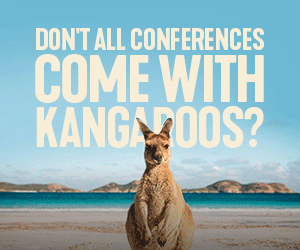ICCA Congress 2020: An Experience of What Future Meetings Might Look Like

The ICCA Congress has become the must attend event for all involved in international association meetings. Providing top class education on latest trends in association meetings and newest technologies and processes to help organise better meetings the ICCA Congress is a unique platform for meetings industry professionals and association executives. This year, the 59th ICCA Congress is being transformed into a hybrid experience like no other. Held in the Asian city of Kaohsiung, the event will showcase a unique hybrid model, complemented with regional hub events created across the globe to coincide with and share the experience for those unable to attend the main congress. Themed “Transforming Global Events Together”, this year's edition will allow ICCA’s global community to connect with each other and explore new ideas, formats and technologies to combine efforts and create the “Kaohsiung Protocol”.
Plenty of reasons to speak with Marta Gomes, 1st Vice President of the International Congress and Convention Association and the CEO, Senthil Gopinath, about the preparations and forecasts for this mega-event.
1) So, let’s start from the beginning: we all have been severely affected by this health crisis that hit the heart of our industry. What makes this year’s ICCA congress, in your eyes, different from the past?
Marta Gomes: In a global context of incertitude, where everyone was deciding on whether to postpone, cancel or go virtual, a few things were immediately clear to us when we met in March to discuss our congress and the way forward. We wanted to honour our commitment to Kaohsiung, who had prepared an amazing bid and already worked so hard on hosting the congress. We wanted to keep the face-to-face international meeting as much as possible, and at the same time allow everyone in the world who wanted to join us be able to do so. We ended up a concept which is completely different from what we’ve done before - a global hybrid event which will be something of an experiment in what future meetings could look like.
2) The ICCA Congress 2020 will break through for an unprecedented event in its history, reformulating its entire model and procedures. How did you respond to the shift in technology, from a complement tool to the essence of the whole process, in one year?
Senthil Gopinath: ICCA strongly believe in face-to-face, however it was essential that we adjust and adapt to the current circumstances and respond to the shift in technology to resume business in the short term. First and foremost, we carried out extensive research to find the best technology available that best suited our members and their ability to engage through platforms. Another important factor was how education elements would be delivered across different forms of technology. With the research completed and the essence of the groundbreaking Congress established, finding the technology to support the ideas and the processes fell into place.
3) The 6-week programme across the ICCA association community that precedes the congress, is a vital part of the framework to be held in Kaohsiung. How do you came up with this idea and how challenging was it to go into this prologue from an organisation's point of view?
 MG: We knew that in order to get as much collaborative thinking and participation happening, it would be difficult for it to be concentrated just in two or three days of congress. So the lead-up or "Road to Kaohsiung" became an important element to start discussions and identify the topics and themes before the actual event. It also allowed us to extend the engagement with our community around the world, and get people involved on a sector level, by exchanging experiences during the three topic weeks with their peers. Our team at the head office, have been working hard behind the scenes to make it all happen, with support from our Board members in the different sectors.
MG: We knew that in order to get as much collaborative thinking and participation happening, it would be difficult for it to be concentrated just in two or three days of congress. So the lead-up or "Road to Kaohsiung" became an important element to start discussions and identify the topics and themes before the actual event. It also allowed us to extend the engagement with our community around the world, and get people involved on a sector level, by exchanging experiences during the three topic weeks with their peers. Our team at the head office, have been working hard behind the scenes to make it all happen, with support from our Board members in the different sectors.
4) In our various contacts with the MICE and association community, the most common statement has been "we believe that virtual events are here to stay, but that they will never replace face-to-face meetings". Do you consider that, as an industry, we are being too optimistic or are there strong reasons for this widespread sentiment?
SG: At ICCA, we believe that virtual will never replace face-to-face as people, humans, have inherent needs to engage in person and it’s these interactions that foster strong business relationships and collaboration. We need to prove to government and policy makers that our industry is resilient and innovative, and making every effort to support economies even without the ability to meet in person. However, it’s important to understand we need to embrace virtual right now to engage with members and community, to not slow down an entire industry. This shift to virtual and hybrid solutions has shown the world that we can continue for now, but when the time is right, face-to-face will return.
5) “Transforming Global Events Together” will be the theme of this year's event and many industry players have accentuated the collaborative aspect in this period of retraction. Does ICCA see this moment as a historic opportunity to jump to a higher level of true coalescence?
MG: We absolutely believe this. In moments of crisis is more important than ever to come together, and speak with one voice. The current situation reinforced some of the strategic alliances which we already had in place, like the G3 collaboration with UFI and AIPC, and accelerated the conclusion of some new partnerships with other associations like ASAE, ESAE and AC Forum, for example. We have also had great involvement and input from our ICCA Association Community - launched in January 2020. Furthermore, association executives and event owners have been with us on every step of this journey. As we all talk to our governments about the importance of our industry for economic recovery, scientific progress and innovation, a global united message is always more powerful than lots of individual claims. The work carried out in accordance with international standards for sanitary protocols, is just one example on how these partnerships are already bringing concrete benefits for our members and the meetings industry as a whole, providing a framework for safe reopening of venues and events.
6) What future do you foresee for congresses’ and conventions’ organisers? Is this a good time for experimenting new strategies, or focus should rather be put on prevention and safety?
SG: It’s essential to understand the reality we’ve been dealing with and now it is definitely time to look at reskilling and revising strategies. We should take this as a learning curve and see at how we can sustain as an industry if we're faced with a new challenge.
7) ICCA has also included seven regional hubs to extend, in real time, the representativeness and interaction between its various members in a hybrid format. Was it important for you to highlight the global and logistical nature of the association even in times of distance and digital comms?
MG: It was most of all important for us to provide opportunities for our members to meet in person. We are the global meetings industry after all! It was also an opportunity to showcase the possibilities for organizing a new kind of international conference, demonstrate some of the new technologies available for streaming content, and creating platforms for interaction and networking online. We will also be releasing a case study video after the event, sharing the story and a look “behind the scenes” so that others can be inspired by some of the ideas and solutions we are pioneering at our event this year.
8) According to ICCA, are there enough resources in terms of research, funding and governmental support, for a new “smart meetings industry”?

SG: ICCA is lobbying with many governmental bodies and looking at funding for smart meetings. Although there is support for the short term, sadly there isn’t much available for the longer term adequately. Governments need to recognise the importance of the events industry, and more research needs to be carried out on appropriate technology and solutions for the future of the industry.
9) In the "Road to Kaohsiung" there will be a chance to establish a framework identifying major trends and key strategies to accelerate international meetings in the near future. What are your expectations for the acceptance of the 'Kaohsiung Protocols' as true operational guides for both parties (associations/destinations)?
As was said by a Nobel Laureate in Physics, "Prediction is very difficult, especially if it's about the future". It’s difficult for all of us, as individuals and organizations, to have a clear view of how some of the macro trends that we see with changes in people’s behavior - how they work, travel, interact - will have on meetings and events in the future. The aim of the Kaohsiung protocols is for the industry as a whole to focus on which trends seem the most urgent for us to address, and to come up with some practical tools and advice for all of our sectors. From transport, to venues, to destinations, PCOs and meetings support companies, and for the associations themselves, to be better armed to face the challenges and opportunities of 2021 and the coming years.
10) Finally, this 59th ICCA Congress will have half of its logistics and programmatic drive on digital platforms. What digital tools and skills do participants really need to attend this hybrid format?
The platform that ICCA has introduced is built and designed to be intuitive and easy for our members to use. Other than login details and internet connection, there are no other digital tools or specific skills that members require in order to gain the most out of the 59th ICCA Congress. Anyone can take part!
For More Info:
events.iccaworld.org/congress2020
Lisa Harrison – Marketing and Communications Executive
Lisa.h@iccaworld.org
Other Articles
About Us
Supported by the Union of International Associations (UIA), the International Association of Professional Congress Organisers (IAPCO) and the Interel Group, the global public affairs and association management consultancy, Headquarters Magazines serve the needs of international associations organising worldwide congresses.















